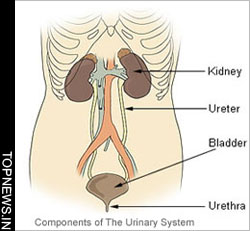Novel device may help with bladder control
 Washington, Apr 15 : People with urinary incontinence have been offered a new hope in the form of an electrical device that controls the bladder.
Washington, Apr 15 : People with urinary incontinence have been offered a new hope in the form of an electrical device that controls the bladder.
The battery-operated implant works with two small electrodes placed beneath the skin, near the sacrum or "tailbone," to give a continuous shock to the nerves that control the bladder, causing the person to feel an uninterrupted tapping sensation in the pelvic area.
"There are few treatments that can claim to cure people with overactive bladders or urinary retention," said lead author G. Peter Herbison, from the Dunedin School of Medicine in New Zealand.
"It is possible that implanted pulse generators will do just that," the expert added.
"Depending on how it is defined, around 17 million people in the U. S. may have bladder control problems," said Kenneth Peters, M. D., chairman of urology at Beaumont Hospital in Royal Oak, Mich.
Some people respond to medications, behavioral therapy or other noninvasive means, while surgery is useful mostly for those with stress incontinence.
Herbison and his co-author wanted to determine the effects that this type of device had in people with urine storage and voiding problems. They reviewed eight published studies involving 500 patients who had not responded to other less invasive treatments.
Most of the studies did not indicate whether participants were men or women. The reviewers deemed study quality either poor or difficult to assess; therefore, they did not combine the data for a pooled analysis. The reviewers also said that most of the longer-term studies have a poor rate of follow-up, which means there are questions about their reliability.
Overall, the results showed benefits primarily for patients with symptoms of overactive bladder and with no known obstruction who had failed other methods of treatment.
The review appears in the current issue of The Cochrane Library, a publication of The Cochrane Collaboration, an international organization that evaluates research in all aspects of health care. (ANI)